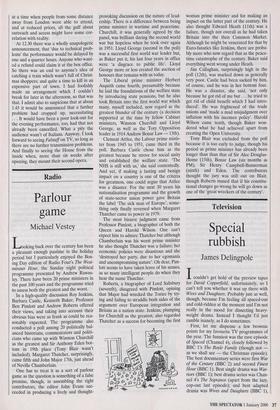Radio
Parlour game
Michael Vestey
Looking back over the century has been a pleasant enough pastime in the holiday period but I particularly enjoyed the Box- ing Day edition of Radio Four's The West- minster Hour, the Sunday night political programme presented by Andrew Rawns- ley. There have been 20 prime ministers in the past 100 years and the programme tried to assess both the greatest and the worst. In a high-quality discussion Roy Jenkins, Barbara Castle, Kenneth Baker, Professor Ben Pimlott and Andrew Roberts offered their views, and taking into account their obvious bias were as frank as could be rea- sonably expected. The programme also conducted a poll among 20 politically bal- anced historians, commentators and politi- cians who came up with Winston Churchill as the greatest and Sir Anthony Eden bot- tom in 19th place (Tony Blair wasn't included). Margaret Thatcher, surprisingly, came fifth and John Major 17th, just ahead of Neville Chamberlain.
One has to treat it as a sort of parlour game as the question is something of a false premise, though, in assembling the right contributors, the editor John Evans suc- ceeded in producing a lively and thought- provoking discussion on the nature of lead- ership. There is a difference between being prime minister in wartime and peacetime. Churchill, it was generally agreed by the panel, was brilliant during the second world war but hopeless when he took over again in 1951. Lloyd George (second in the poll) was a successful first world war leader but, as Baker put it, his last four years in office were 'a disgrace to public life'. Lloyd George more or less created the auction of honours that remains with us today.
The Liberal prime minister Herbert Asquith came fourth, presumably because he laid the foundations of the welfare state by introducing state pensions, but he also took Britain into the first world war which many, myself included, now regard as the greatest blunder of the century (a decision supported at the time by fellow Cabinet ministers, Winston Churchill and Lloyd George, as well as the Tory Opposition leader in 1914 Andrew Bonar Law — 13th).
Clement Attlee, the Labour prime minis- ter from 1945 to 1951, came third in the poll. Barbara Castle chose him as the greatest because he strove for social unity and established the welfare state. 'The NHS is still with us,' she said contentedly. And yet, if making a lasting and benign impact on a country is one of the criteria for greatness, one could argue that Attlee was a disaster. For the next 30 years his nationalisation programme and the growth of state-sector union power gave Britain the label 'The sick man of Europe', some- thing only finally reversed when Margaret Thatcher came to power in 1979.
The most bizarre judgment came from Professor Pimlott, a biographer of both the Queen and Harold Wilson. One can't expect him to admire Thatcher but although Chamberlain was his worst prime minister he also thought Thatcher was a failure; her economic policies were disastrous and she `destroyed her party, due to her egomania and uncompromising nature'. Oh dear, Pim- lott seems to have taken leave of his senses, as so many intelligent people do when they hear the name Thatcher.
Roberts, a biographer of Lord Salisbury (seventh), disagreed with Pimlott, opining that Major had wrecked the Tories by try- ing and failing to straddle both sides of the argument over European integration and Britain as a nation state. Jenkins, plumping for Churchill as the greatest, also regarded Thatcher as a success for becoming the first woman prime minister and for making an impact on the latter part of the century. He also thought Edward Heath (11th) was a failure, though not overall as he had taken Britain into the then Common Market. Although he might be venerated for that by Euro-fanatics like Jenkins, there are proba- bly more who now regard that as the peace- time catastrophe of the century. Baker said everything went wrong under Heath.
Jim Callaghan, surprisingly high in the poll (12th), was marked down as generally very poor. Castle had been sacked by him, of course, and he was in her bottom four. He was a disaster, she said, 'not only because he got rid of me but ... he tried to get rid of child benefit which I had intro- duced'. He was frightened of the trade unions and 'made a mad misjudgment over inflation with his incomes policy'. Harold Wilson came tenth, though Baker won- dered what he had achieved apart from creating the Open University.
Tony Blair was excluded from the poll because it is too early to judge, though his period as prime minister has already been longer than than that of Sir Alec Douglas- Home (15th), Bonar Law (six months as PM), Sir Henry Campbell-Bannerman (ninth) and Eden. The contributors thought the jury was still out on Blair, though Roberts mused that if his constitu- tional changes go wrong he will go down as one of the 'great wreckers of the century'.


















































 Previous page
Previous page